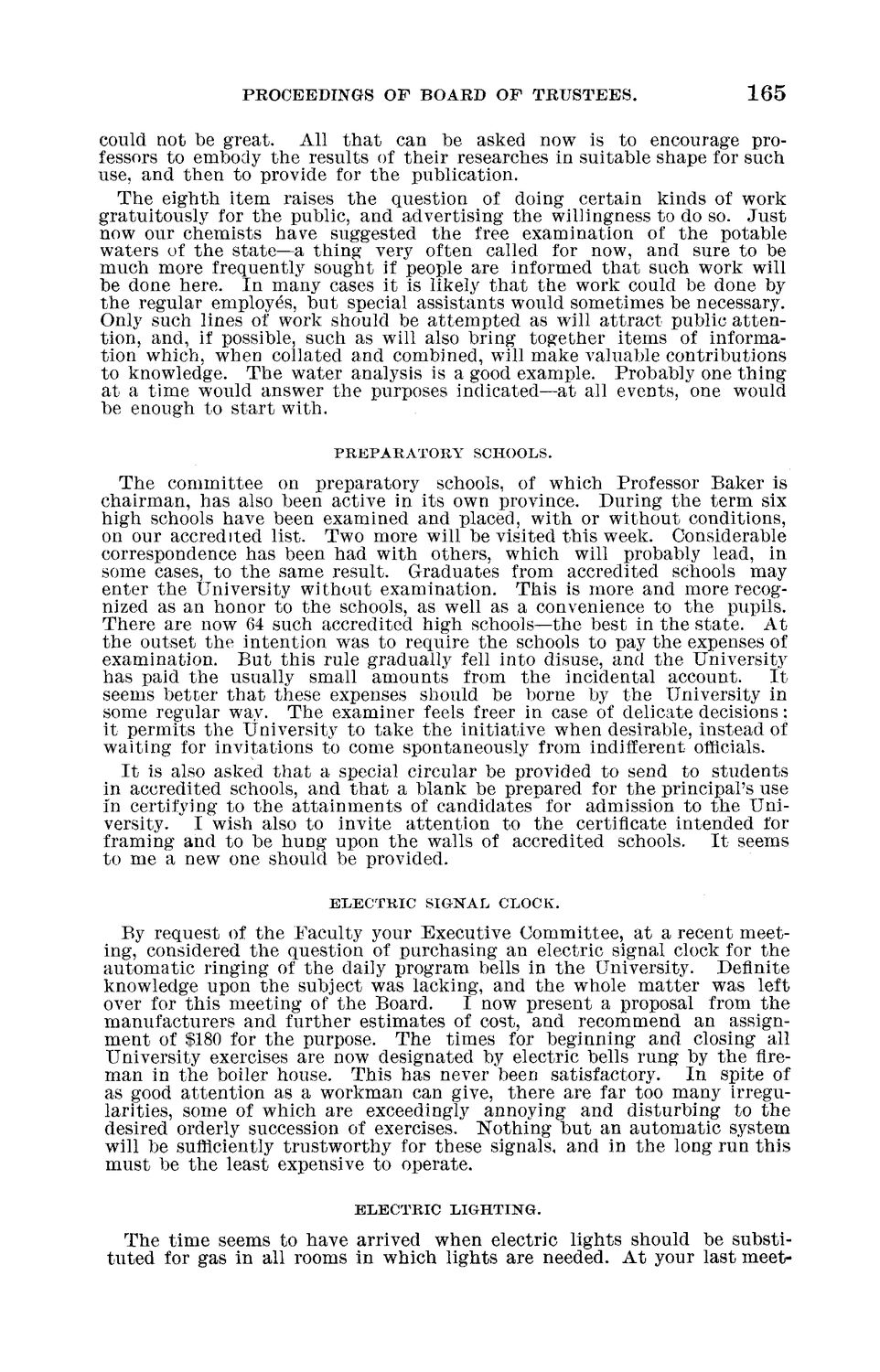| |
| |
Caption: Board of Trustees Minutes - 1892
This is a reduced-resolution page image for fast online browsing.

EXTRACTED TEXT FROM PAGE:
PROCEEDINGS O F BOARD O F TRUSTEES. 165 could not be great. All t h a t can be asked now is to encourage professors to embody the results of their researches in suitable shape for such use, and then to provide for the publication. The eighth item raises the question of doing certain kinds of work gratuitously for the public, and advertising the willingness to do so. Just now our chemists have suggested the free examination of the potable waters of the state—a thing very often called for now, and sure to be much more frequently sought if people are informed t h a t such work will be done here. I n many cases it is likely t h a t the work could be done by the regular employes, but special assistants would sometimes be necessary. Only such lines of work should be attempted as will attract public attention, and, if possible, such as will also bring together items of information which, when collated and combined, will make valuable contributions to knowledge. The water analysis is a good example. Probably one thing at a time would answer the purposes indicated—at all events, one would be enough to start with. P R E P A R A T O R Y SCHOOLS. The committee on preparatory schools, of which Professor Baker is chairman, has also been active in its own province. During the term six high schools have been examined and placed, with or without conditions, on our accredited list. Two more will be visited this week. Considerable correspondence has been had with others, which will probably lead, in some cases, to the same result. Graduates from accredited schools may enter the University without examination. This is more and more recognized as an honor to the schools, as well as a convenience to the pupils. There are now 64 such accredited high schools—the best in the state. At the outset the intention was to require the schools to pay the expenses of examination. But this rule gradually fell into disuse, and the University has paid the usually small amounts from the incidental account. It seems better t h a t these expenses should be borne by the University in some regular way. The examiner feels freer in case of delicate decisions: it permits the University to take the initiative when desirable, instead of waiting for invitations to come spontaneously from indifferent officials. I t is also asked t h a t a special circular be provided to send to students in accredited schools, and t h a t a blank be prepared for the principal's use in certifying to the attainments of candidates" for admission to the University. I wish also to invite attention to the certificate intended for framing and to be hung upon the walls of accredited schools. I t seems to me a new one should be provided. E L E C T R I C SIGNAL CLOCK. By request of the Faculty your Executive Committee, at a recent meeting, considered the question of purchasing an electric signal clock for the automatic ringing of the daily program bells in the University. Definite knowledge upon the subject was lacking, and the whole matter was left over for this meeting of the Board. I now present a proposal from the manufacturers and further estimates of cost, and recommend an assignment of $180 for the purpose. The times for beginning and closing all University exercises are now designated by electric bells rung by the fireman in the boiler house. This has never been satisfactory. I n spite of as good attention as a workman can give, there are far too many irregularities, some of which are exceedingly annoying and disturbing to the desired orderly succession of exercises. Nothing but an automatic system will be sufficiently trustworthy for these signals, and in the long run this must be the least expensive to operate. ELECTRIC LIGHTING. The time seems to have arrived when electric lights should be substituted for gas in all rooms in which lights are needed. At your last meet-
| |